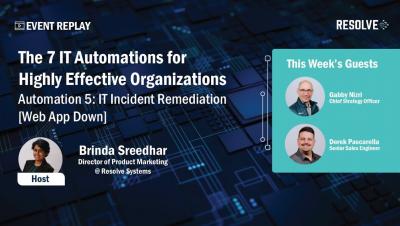Operations | Monitoring | ITSM | DevOps | Cloud
Incident Management
The latest News and Information on Incident Management, On-Call, Incident Response and related technologies.
Redundancy for IT resilience: The backup guide for a disaster-proof network
Around six years ago on a Wednesday morning, software professionals worldwide were startled by a tweet from GitLab stating that they had accidentally deleted their production data, causing their site to go offline. Unfortunately, at that point in time, the open-source code repository giant had no idea that it would take them another 36 hours to restore their systems only to learn that 5,000 projects and 700 new user accounts were affected while they were fixing the outage.
The Guide to SRE Principles
The 7 IT Automations for Highly Effective Organization: IT incident Remediation | Web App Down
Komodor + Squadcast Integration: Simplifying Kubernetes Monitoring & Incident Response
How metrics can make or break your IT operations strategy
IT people know that data is king, especially in optimizing IT operations. However, figuring out which metrics to collect and how to collect them can be challenging. IT teams have to factor in what IT directors, team managers, and the people overseeing operations want, what they’re concerned about, and what they consider important.
Managing Incidents in Energy and Utility Companies
Several challenges impact customers and operations of utilities and energy companies, including aging infrastructure, cybersecurity threats, inclement weather, operational failures and transmission interruptions. These challenges can cause prolonged service disruptions, potentially leading to customer attrition and irreversible damage to businesses. Responding quickly and efficiently to incidents is critical to minimize damages or contain potentially dangerous scenarios.
PagerDuty Introduces First Process Automation Solution for the PagerDuty Operations Cloud
What are you learning from your incidents?
Think about this—what was the last incident that challenged you? Did you learn anything from it? It will be shocking to no one to hear that we deal with our fair share of incidents. These run the gamut from tiny bugs to significant outages (thankfully, the latter happening only very rarely 😮💨). Either way, we always take the time to learn from them in some way. This might look like changes to our response processes or revisiting systems we’re using.
Top 5 Managed Detection and Response Services and How to Choose
Managed Detection and Response (MDR) is an approach to cybersecurity that combines advanced technologies, skilled analysts, and a proactive response process to detect, investigate, and remediate cyber threats. MDR is typically delivered as a service by a third-party provider and includes a range of security capabilities, such as threat intelligence, behavior analysis, anomaly detection, and incident response.










